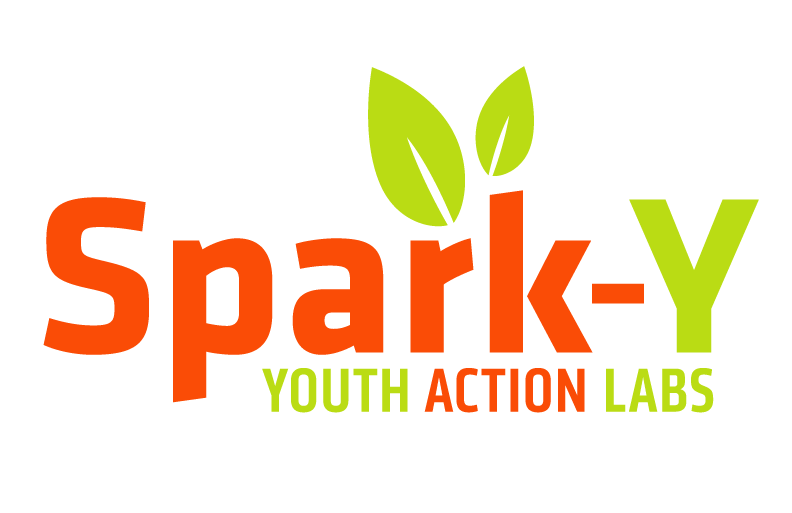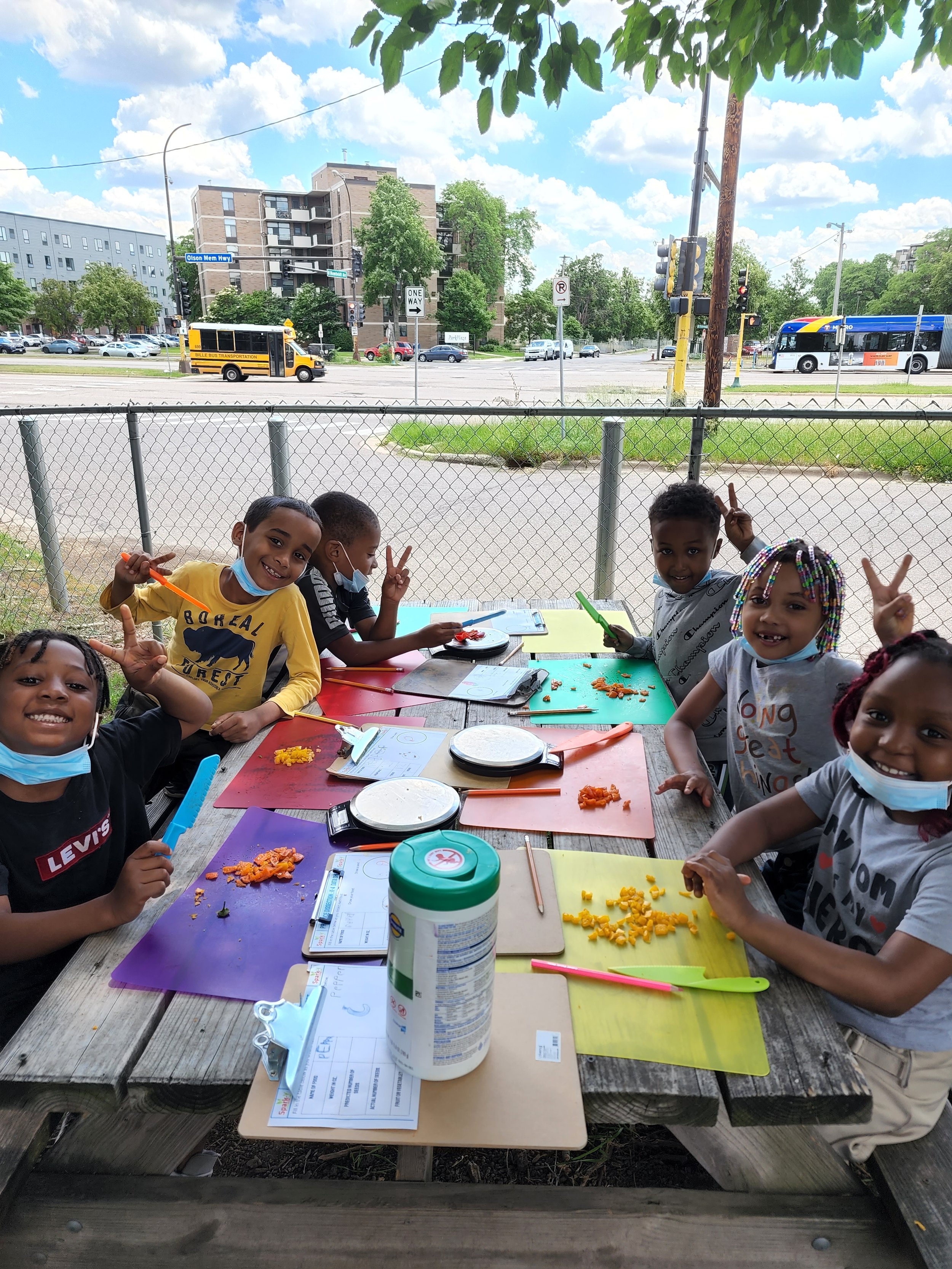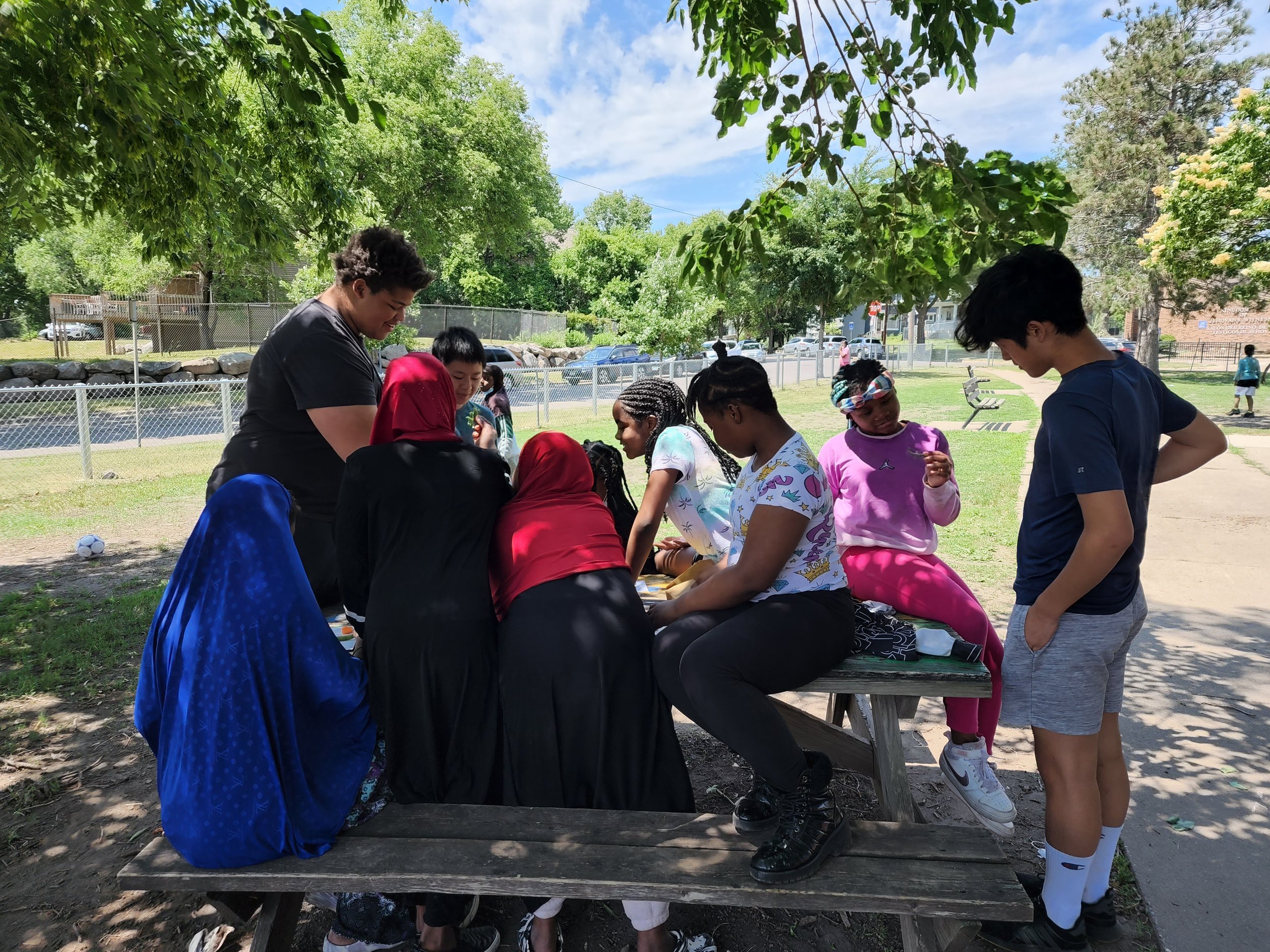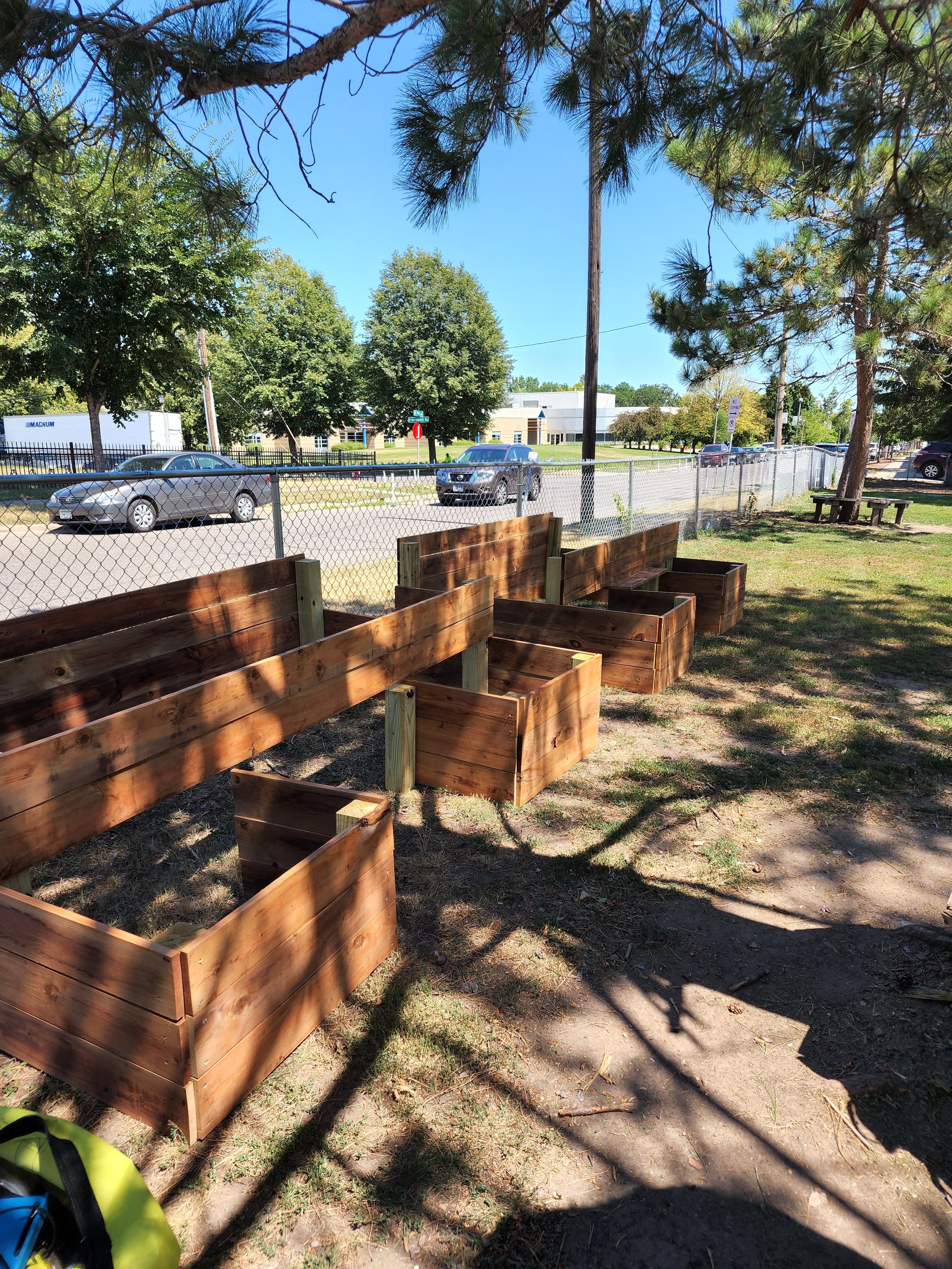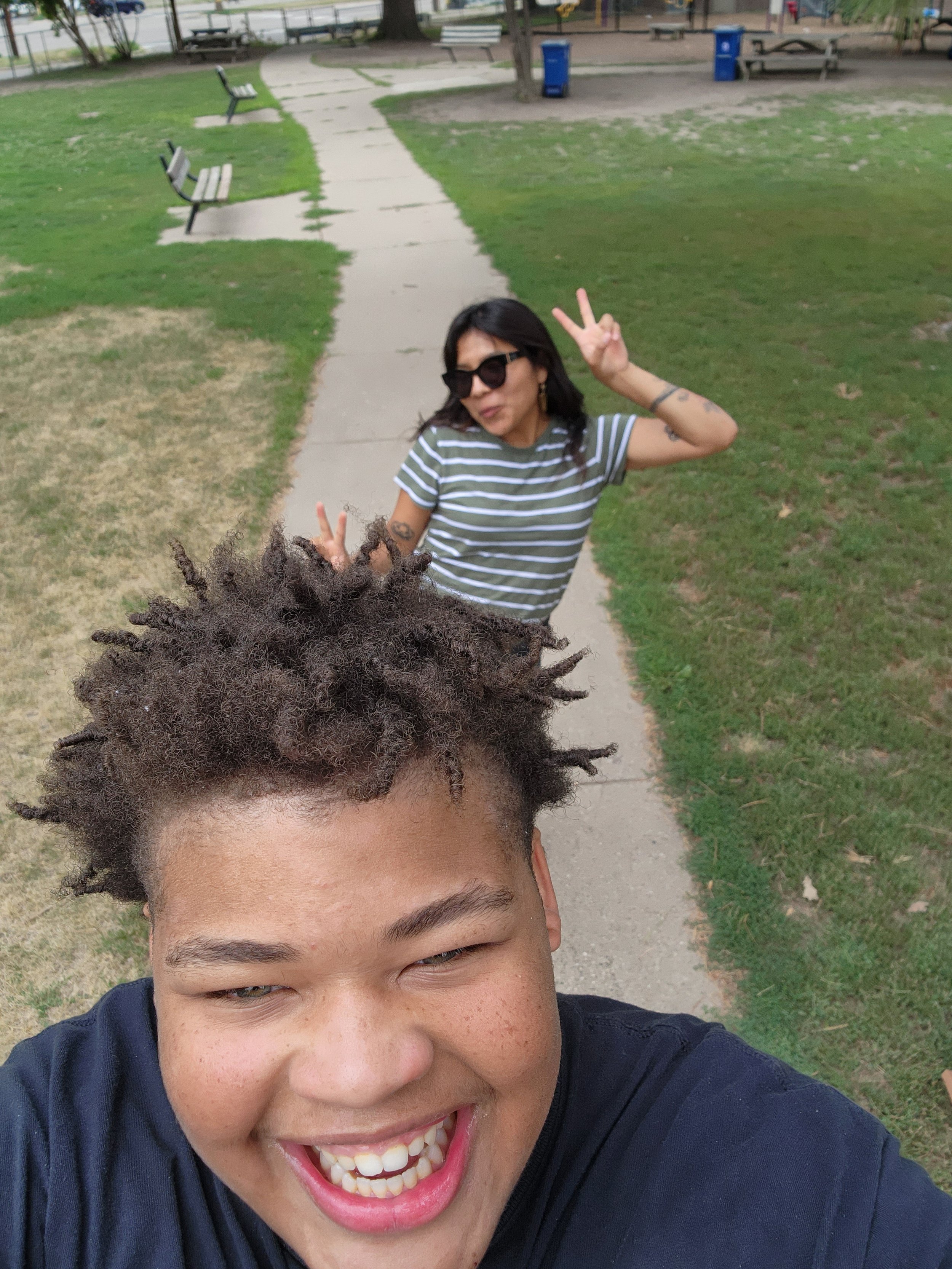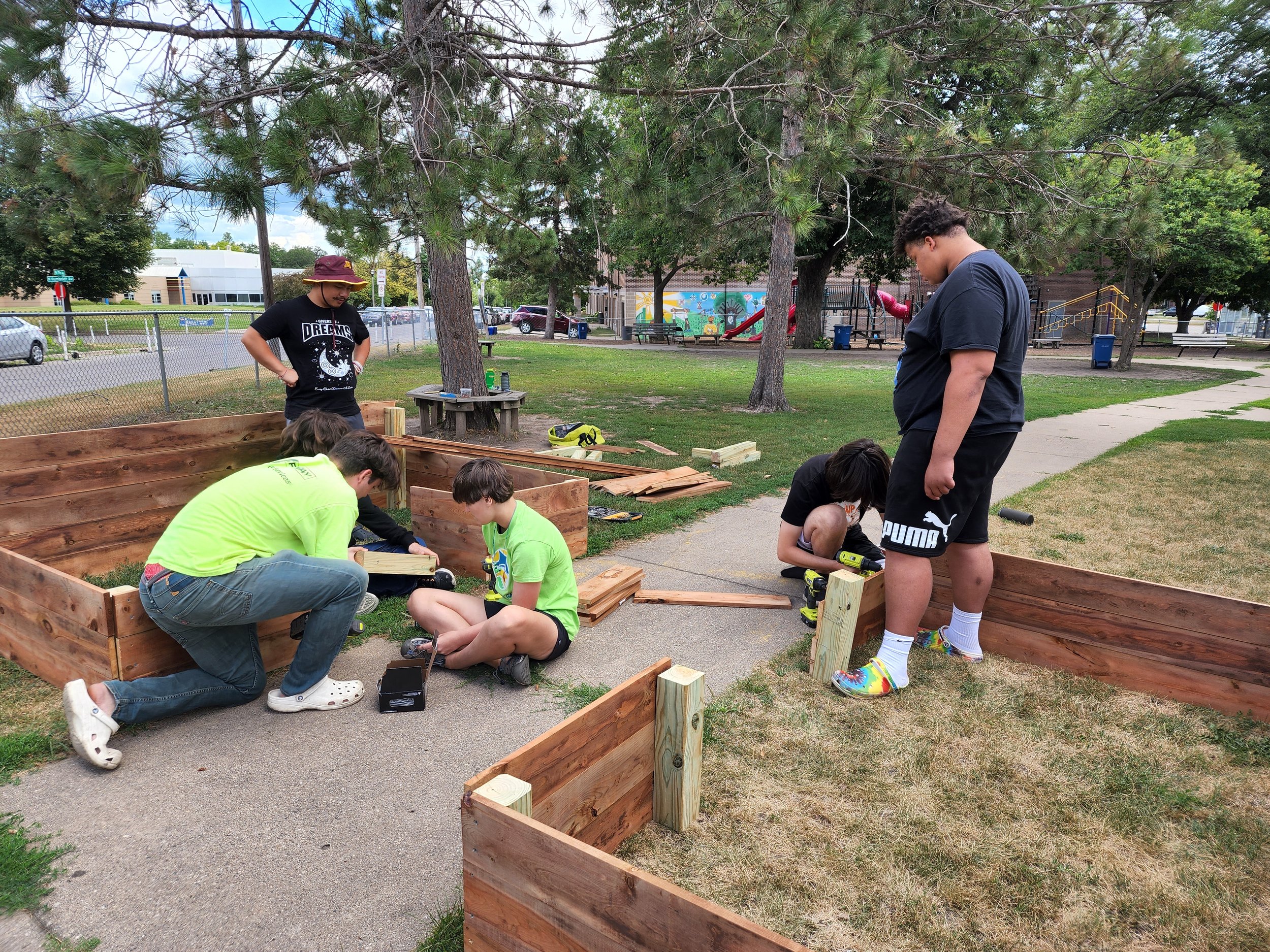In partnership with Minnesota Sea Grant and the North Central Regional Aquaculture Center, (NCRAC), Spark-Y Interns developed and filmed two instructional videos relating to tilapia - a popular fish used in aquaponic systems.
Viewing entries tagged
internship
Hello Spark-Y Family!
We are the Right Track Summer Internship Team which consists of Jaraide Dassovi (Lead), Navious Bogan, Best Yang, and Eh Ler Vang. This summer our team was responsible for 3 general projects, Harold Mezile YMCA North, STEM Saturday and Harvest Best Academy! Outside of these projects, we’ve had a blast on the field trip to Lake Bde Maka Ska and enhancing our professional development skills in weekly sessions. Meet our team members and the experiences that impacted us most!
Hello my name is Best Yang an intern at Spark-Y that started working this summer.
Here at Spark-Y we work to benefit and help the community so that they can learn about STEM and planting in general. Earlier this summer me and some of my co-workers went to City Hall to plant some flowers at the entrance of the building.
City Hall asked if we could help them by planting some new flowers at the front door of the building. When me and my coworkers were told about the plans to plant flowers at City Hall I was feeling excited to go there because I never went to City Hall in my entire life before until now. When we went to City Hall it was a very hot day out in the sun with little to no shade to hide under. By the end of the day we were all tired being out in the sun and just wanted to go to an area with AC.
This project helps the city in the long run by making sure that pollinators like bees will stick around the area and have pollen and nectar to feed on. I believe that by doing this I can help pollinators by providing pollen and nectar. Something that I learned from this is how to plant flowers because I never planted one before. Also by making pollinator gardens you are providing resources to pollinators which will help them accomplish the great work they do! - Best Yang
Hello my name is Navious Bogan and I'm a summer intern for Spark-Y. During the Bde Maka Ska field trip, I learned how to canoe in under 20 minutes. I faced my fear of being in the middle of a large body of water. In my time while working for Spark-Y I did a wide variety of things, I planted at the City Hall, and maintained the YMCA aquaponics systems this system is located at Harold Mezile North Community YMCA. I cleaned out the system and tested the water to make sure everything was okay. One of my favorite projects was the Cargill project where volunteers help build STEM kits. The STEM kits that were being built were the zombie apocalypse, there used for building vegetables such as Broccoli,Pea, and more. This project was held at Cargill, Inc. in Wayzata, MN.
- Navious bogan
”It was very hot” - Eh Ler
Building Joy
This season Spark-Y reached a more dynamic age range 1st-8th grade. Our summer programming focused on bridging environmental stewardship with a healthy lifestyle. We incorporated this education by engaging the scholars in agricultural practices and lessons on a small scale, such as gardening and understanding the cultural and nutritional value of fresh produce. One of the most popular lessons being produce dissections!
One of the deliverables for the Summer Internship Right Track Team is to design and build a school garden at Harvest Best Academy. We have spent a total of 4 days building this raised bed. Most days were bright and sunny but we did get rained on twice! It has been a joy watching the Right Track Interns learn new, or enhance, their hard skills working with tools such as drills and learning how to assemble a build using a blueprint. As we wrap up this build, we are happy to say the Special Education Department will be utilizing the garden during the 2022-23 school year! Thank you to the Community Education Team Summer Interns and Jordan Bergstrom, Spark-Y Sustainable Systems Manager, for their support and infectious enthusiasm to complete this project! - Grace Cisneros, Sustainability Educator and Right Track Staff Lead.
Spark-Y’s summer internship program provides hands-on engagement opportunities for High School students where they can experience and learn about sustainability, professionalism, and teamwork under the mentorship of Spark-Y Apprentices and full time staff. In the beginning of July this summer, our group came together to form the Community Education team. Our team members include Chue, our Sustainability Educator, Sam, our Sustainability apprentice, and Jaylah, Joe, Sebastian and Oliver, our Sustainability Interns. We have been working together on multiple projects such as the Mobile Innovation Lab (The Beast), the greenhouse at Roosevelt High School, and several activities centered in professional development. We want to share some of our experiences with you in this post!
The Mobile Innovation Lab, known to many students as The Beast, started out as an innovative way to take learning directly to many students in North Minneapolis. It combats the disparities and lack of accessibility that many students experienced during Covid. This summer, we, as the community education team, mobilized our team strength into supporting this amazing mobile learning bus. Joe, Jaylah, and Chue supported the Beast on the ground as a team by engaging and supporting over 60 students as they learned about coding, drones, and the scientific method. As the on the ground team, each day is a new and exciting experience. From doing pushups and sit ups as robotic drones following the codes that students wrote to watching students design and give animate life to an orange cat using the Scratch coding program, there is never a boring day on The Beast. As the capacity of The Beast is limited to 15 people, three members of our team find other outlets for supporting the Beast. Sam, Sebastian, and Oliver work on preparing for the next mobile innovation learning modules. Their continuous effort on creating material lists and activity guides has helped to prepare Spark-Y for future fun on the bus. Through our work on The Beast, we have all learned a lot about education, supervision, and project planning.
Spark-Y has partnered with Roosevelt High School since 2013, and our team responsibility this summer is to maintain and upkeep the greenhouse in front of Roosevelt High School. The purpose of the greenhouse is to provide a space for growing nutritious foods for the school and community. For the greenhouse, our team focused on improving the depleted soil in the greenhouse plant beds. One thing we did to improve the soil was take compost and put it in the two plant beds. As a team, we created a garden layout of all of the plants that are going to be planted in the greenhouse. We also designed a trellis that is going to be built and put in the green house for the cucumbers and beans that need a structure to climb on. To design the trellis, we first did some research on what other effective trellises look like. We then took inventory of the materials we had on hand. Individually, we all came up with our own designs, and then we each presented our ideas to the rest of the group. We were able to discuss the pros and cons of each design and work as a team to incorporate the best aspects of each idea into our best final design. Some other garden work that we did as a team also included removing weeds at Friendship Academy and helping maintain their gardens. We hope that all the work we do this summer will benefit Roosevelt and others in the community for the future to come. We also hope that the plants will grow in the greenhouse without any of the thrip problems that previously affected the greenhouse.
Another notable event that the entire Spark-Y team had an opportunity to participate in was several professional development days, where several guest speakers, including Spark-Y’s own Executive Director Zach Robinson, helped us improve our conflict resolution skills, write better resumes and emails, and hone our leadership and communication ability. Through these engaging sessions, our group was able to think more deeply about potential future career paths as well as cultivating our own character so that we may thrive. A large part of these presentations was a myriad of hands-on activities, including a survey to determine potential career paths, a quiz to attempt to point out aspects of a professional inter-team message, and an activity consisting of sorting problems that a team might have into what exact issue was being faced. The last of these was especially effective, as we completed it in several randomly assembled smaller teams, letting us focus more on our individual inquiries about how to resolve these potential occurrences with people who we have worked with less than our focused team groups. Overall, these speakers and the activities they brought with them were an excellent opportunity, and we are glad they came to share their knowledge and help us succeed.
During our internship most of the time was spent on working in a group to meet a goal or get a project done, giving us plenty of opportunities to increase our ability to lead and work as a team. As a team we all had a great time working with each other and expressing our creativity through the projects that we work on, using new experiences as a conduit to come together, learn to work with one another, and create something based on a plan the team had formulated. As the summer continues, we hope that our group can continue to contribute to the community around us through these projects, and keep learning about how to improve both ourselves and the world around us.
About the Spark-Y Right Track+ Internship: The Right Track+ program is a collaboration between Ramsey County, the City of Saint Paul, local employers, and community organizations including Spark-Y. The goal of this program is to provide job training and professional development to unemployed or underemployed young adults experiencing the negative economic impacts of the pandemic for the purpose of assisting them in entering an in-demand career pathway.
Growing Vertical: A Right Track + Internship Experience
My name is Jordan Bergstrom. I am a senior at the University of Minnesota, Twin Cities, studying Urban Infrastructure and the Environment. I am an aspiring vertical farmer, and am planning on attending grad school to earn an MPS in Horticulture. My passions include the intersection of sustainability and environmentalism and urban areas. After hearing about Spark-Y at a career fair, I decided to apply for the Right-Track internship program. Since then, I have started maintaining and operating the aquaponic systems and managing many of the gardens that Spark-Y maintains. Prior to this internship, I knew little about the operation of these systems, however I have learned so much about vertical farming and aquaponic/hydroponic growing techniques since starting this position!
Vertical growing greens at Spark-Y’s Urban Agriculture Lab
Vertical farming is a foundational aspect of Spark-Y’s operations and mission. Using primarily aquaponic technology, Spark-Y has set up a number of vertical farm systems in a plethora of schools across the Twin Cities metro. For those who haven’t heard of vertical farming and aquaponics, as they are still relatively new phenomena, vertical farming is a vertically oriented method of food production achieved through either tower designs, growing racks, or conceptual terraced designs (which are far more rare). Aquaponics is a subset of vertical farming which combines hydroponic technology, which is a soilless method of growing that utilizes constant root exposure to nutrient-rich water, with aquaculture, the raising of fish and other aquatic life. Through a symbiotic relationship, the waste produced by fish is utilized as a fertilizer for plants, after being chemically transformed from Ammonium to Nitrate by bacteria growing in the system. Since water is recycled, the only inputs into the system are fish food and seeds/light layers of soil.
Aquaponic and hydroponic methods of growing have enormous environmental benefits in comparison to conventional farming, using 99% less land, 90% less water, and 100% less harmful chemicals than in soil cultivation. Additionally, these systems allow for urban production, allowing for hyper-localized produce production that eliminates transportation emissions and results in riper, healthier produce in comparison with imported varieties. The only major downside to aquaponic/hydroponic production is increased energy usage due to grow-lights, however this is partially offset by eliminating the need for motorized farm implements as well as decreased land usage for agriculture.
At Spark-Y’s headquarters, there is a large timber frame aquaponic structure set up that produces microgreens each week. My role in this system is to germinate the seeds, place them in the system, then harvest, package, and deliver the microgreens to the Eastside Food Co-op each week. The planting process involves gathering plastic trays, sprinkling a light layer of dirt in them, weighing out the correct number of seeds, and sprinkling the seeds throughout the trays. After this, the trays are sprayed lightly in the sink, and then sprayed with hydrogen peroxide. The water and peroxide help the seeds to germinate (sprout). To aid this process, the seeds are stacked up and weighed down with heavy objects as seeds also respond well under stronger gravitational pressure. After a few days, the germinated seeds are unstacked and placed in the aquaponic system, where the water and nutrients feed them for a few days until they are ready to be harvested. Other maintenance on this system includes testing the fish tank water to make sure chemical levels are safe for fish production, cleaning tanks, and replacing tank water.
In addition to the aquaponic systems, there is a hydroponic grow tower in the Urban Agriculture Lab. The grow tower consists of a water reservoir in the base, a pump that pumps water through a tube up to the top level of the grow rack, spigots that release water into the rows, and rows of plants that consist of a hard sponge-like material that’s bent around a white cloth strip and plants grown in little soil plugs. After the water cycles down through the racks, what isn't used by the plants or evaporated is cycled back into the system. So far, we have had some trouble getting the plants to survive, largely due to plugged spigots and possibly due to intense lighting. We are altering aspects of the tower week by week and recording changes in a spreadsheet. Regardless of the results, this will give us useful experience in growing plants hydroponically!
Overall, it's a lot of work managing aquaponic and hydroponic systems. However I think, these growing methods have the power to revolutionize our food systems if implemented correctly. Vertical farming gives us the potential to achieve food sovereignty as communities, both localizing food production and democratizing it by lessening dependence on large multinational corporations. It comes with plenty of environmental, economic, and health benefits, and will only become a more attractive option as technology and public opinions shift. Hopefully, by teaching youth about these growing methods and allowing them to practice these methods will empower them to play active roles in the ever growing sustainable economy!
